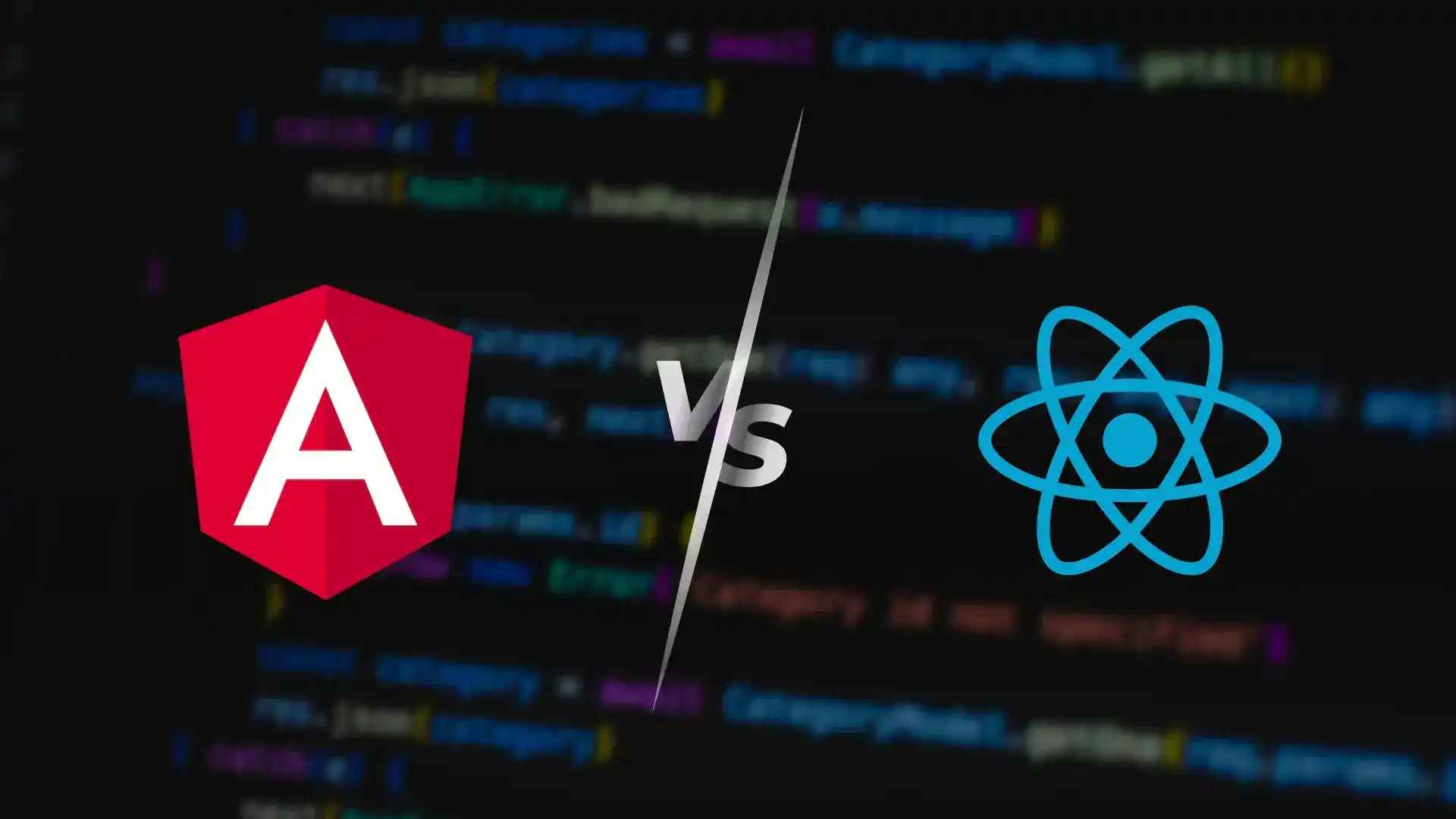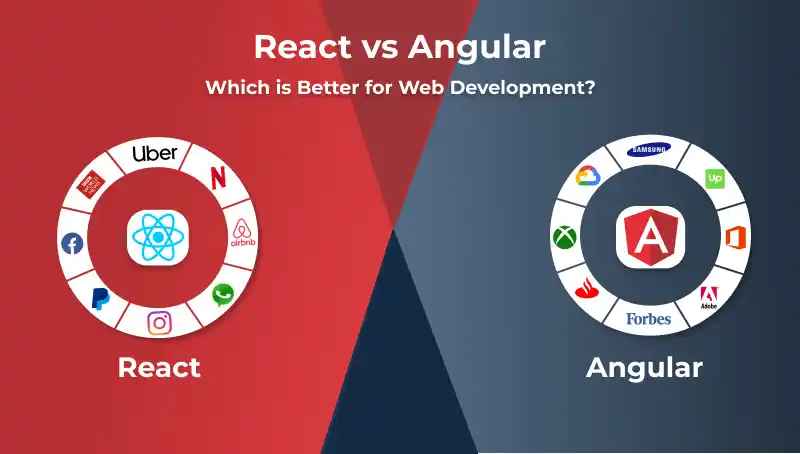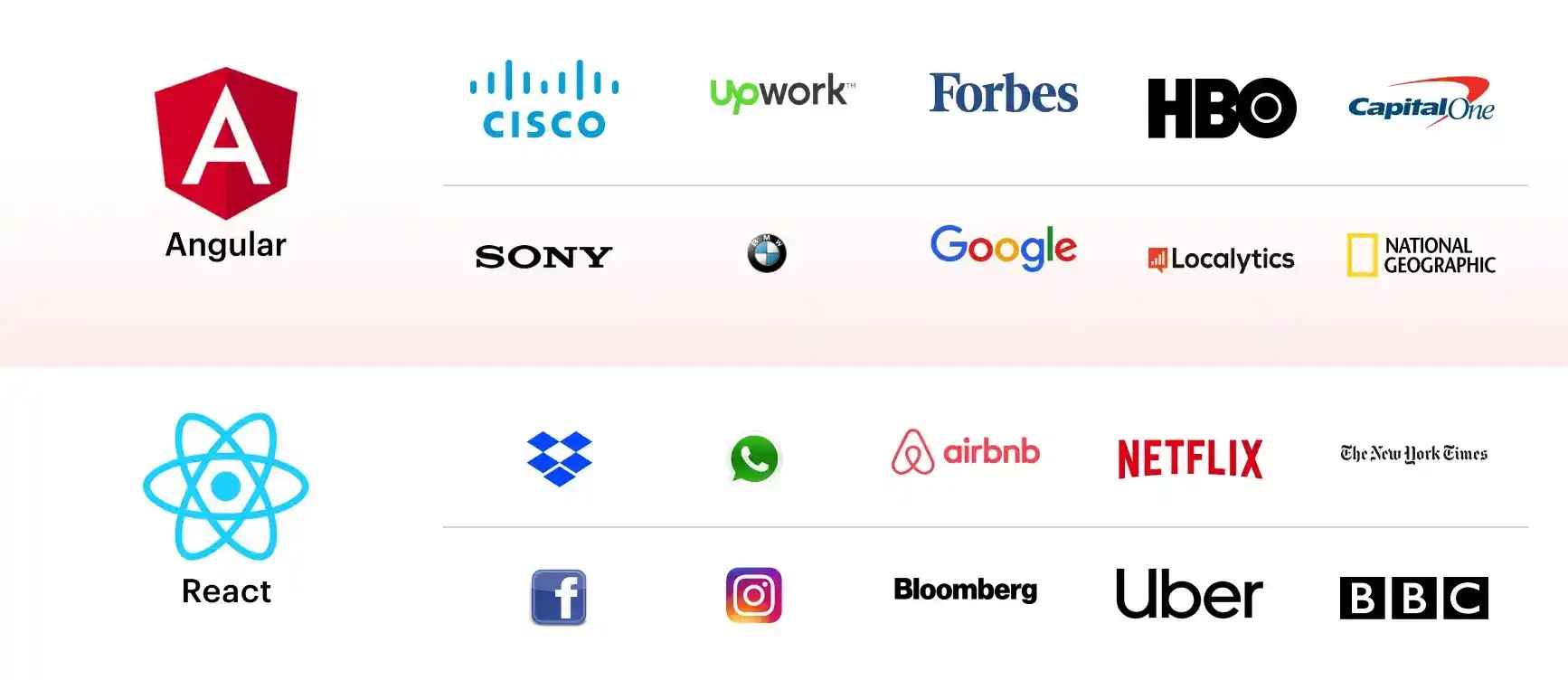React vs Angular: Which Framework Should You Choose in 2025?
Updated on : 09 April, 2025

Image Source: facebook.com
Table Of Contents
- 1. Introduction
- 2. What is React?
- 3. Benefits of React JS
- 4. What is Angular?
- 5. Benefits of Angular
- 6. Language and Syntax
- 7. Architecture
- 8. Data Binding
- 9. DOM Manipulation
- 10. Tooling and Development Experience
- 11. State Management
- 12. Routing
- 13. Performance
- 14. Learning Curve
- 15. SEO and SSR
- 16. Community and Ecosystem
- 17. React JS vs Angular: An Overview of Key Differences
- 18. Job Market: React JS vs Angular JS
- 19. React JS vs Angular: When to Choose What?
- 20. Your team has experience with TypeScript
- 21. Which is Better: Final Verdict
- 22. How Hexadecimal Software Can Help
- 23. Frequently Asked Questions (FAQs)
- 24. Conclusion
Table Of Contents
Introduction
Choosing the right JavaScript framework is critical for the success of modern web applications. React and Angular are among the most popular choices, each offering unique features and benefits.
- An in-depth comparison of React and Angular
- A look at their key strengths and weaknesses
- Use cases to help you make an informed decision in 2025

Image Source: google
What is React?
React is a JavaScript library developed and maintained by Facebook. It focuses on the view layer, making it excellent for building user interfaces (UIs), especially single-page applications (SPAs).
Key aspects of React:
- Focus: Primarily the view layer of an application
- Nature: JavaScript library, not a full-fledged framework
- Maintainer: Developed and maintained by Facebook
Benefits of React JS
React provides:
- Component-Based Architecture: Promotes code reusability.
- Divides the UI into independent, reusable components
- Simplifies development and maintenance
- Virtual DOM: Enhances performance through efficient updates.
- Minimizes direct manipulation of the real DOM
- Optimizes rendering for faster UI updates
- Large and Active Community: Provides ample support and resources.
- Offers a wide range of third-party libraries and tools
- Ensures continuous updates and improvements
Build dynamic, responsive UIs with experienced React developers. Hexadecimal provides vetted professionals who specialize in crafting fast, maintainable front-end applications using React.
What is Angular?
Angular is a TypeScript-based, open-source web application framework led by the Angular Team at Google. It offers a structured environment for building complex applications.
Key aspects of Angular:
- Language: TypeScript, providing strong typing
- Maintainer: Developed and maintained by Google’s Angular Team
- Type: A comprehensive, full-fledged web application framework
Get expert Angular developers to build scalable, high-performance web apps. Hexadecimal Software offers dedicated Angular talent for robust front-end development, tailored to your project needs.
Benefits of Angular
Angular offers the benefits of:
- TypeScript: Enables better code maintainability and scalability.
- Offers static typing for improved code reliability
- Supports modern JavaScript features
- Component-Based Architecture: Supports the creation of reusable components.
- Organizes code into manageable and reusable pieces
- Enhances code maintainability
- Comprehensive Tooling: Offers tools for development, testing, and maintenance.
- Provides a CLI (Command Line Interface) for easy project setup and management
- Includes testing frameworks and build tools

Got a Game-Changing App Idea? Let’s Build It Together.
Language and Syntax
| Aspect | React | Angular | Explanation |
|---|---|---|---|
| Primary Language | JavaScript + JSX | TypeScript | React uses JavaScript along with JSX for templating, while Angular relies on TypeScript. |
| Learning Barrier | Lower | Moderate to High | JavaScript is generally easier to learn initially, but TypeScript adds structure for larger projects. |
| Type Safety | Optional (with TypeScript) | Mandatory | Angular enforces TypeScript for improved code reliability. |
Architecture
| Aspect | React | Angular | Explanation |
|---|---|---|---|
| Framework Type | Library | Full-fledged Framework | React is focused on UI components, while Angular provides a complete application architecture. |
| Structure | Unopinionated | Opinionated | React is flexible with project structure, while Angular follows a more rigid architectural pattern. |
| Modularity | Component-Based | Component-Based (Modules) | Both frameworks support modularity and reusable components. |
Data Binding
| Aspect | React | Angular | Explanation |
|---|---|---|---|
| Binding Type | One-way | Two-way | React enforces one-way data binding, whereas Angular supports two-way data binding. |
| Debugging Ease | Easier | Potentially More Complex | One-way data flow simplifies debugging in React. |
| Performance Impact | More Efficient | Can Introduce Overhead | Two-way binding can sometimes lead to performance issues in large applications. |
DOM Manipulation
| Aspect | React | Angular | Explanation |
|---|---|---|---|
| DOM Type | Virtual DOM | Real DOM with Change Detection | React's virtual DOM improves performance by minimizing direct DOM manipulations. |
| Update Speed | Faster | Potentially Slower | React's updates are generally faster due to the virtual DOM. |
| Control | Manual (Fine-Grained) | Framework-Controlled | React gives developers more control over DOM updates. |
Tooling and Development Experience
| Aspect | React | Angular | Explanation |
|---|---|---|---|
| CLI Support | Create React App, Next.js | Angular CLI | Angular CLI provides powerful commands for scaffolding and building applications. |
| Code Splitting | Needs manual setup | Built-in | Angular has native support for lazy loading and code splitting. |
| Testing Support | Jest, Enzyme, Testing Library | Karma, Jasmine | Angular provides a comprehensive testing environment out of the box. |
State Management
| Aspect | React | Angular | Explanation |
|---|---|---|---|
| Built-in Solution | None | RxJS, NgRx (Optional) | React typically relies on third-party libraries like Redux for state management. |
| Flexibility | High | Moderate | React offers a wide range of state management options. |
| Learning Curve | Library-Specific | RxJS, NgRx | Angular utilizes RxJS for handling asynchronous data and state management. |
Routing
| Aspect | React | Angular | Explanation |
|---|---|---|---|
| Routing Setup | React Router | Built-in Router | Angular includes its routing module as a core feature. |
| Lazy Loading | Requires Configuration | Built-in Support | Angular's router supports lazy loading out of the box. |
| Guards & Resolvers | Custom Implementations | Built-in | Angular's router provides built-in guards and resolvers for route protection. |
Performance
| Aspect | React | Angular | Explanation |
|---|---|---|---|
| Rendering Speed | Optimized | Optimized | Both frameworks can achieve high rendering speeds with proper optimization techniques. |
| Initial Load Time | Faster | Potentially Slower | React typically has faster initial load times due to a smaller bundle size. |
| Optimization Tools | Third-Party | Integrated | Angular benefits from built-in optimization tools like Ahead-of-Time (AOT) compilation. |
Learning Curve
| Aspect | React | Angular | Explanation |
|---|---|---|---|
| Ease of Learning | Easier for JS Devs | Steeper Learning Curve | React is more approachable for developers with a solid JavaScript background. |
| Setup Complexity | Lower | Higher | Angular involves more concepts like modules and decorators. |
| Onboarding Time | Faster | Slower | React offers faster initial prototyping and development. |
SEO and SSR
| Aspect | React | Angular | Explanation |
|---|---|---|---|
| SEO Support | Good, Next.js enhanced | Good, Angular Universal enhanced | Server-Side Rendering (SSR) is essential for SEO with both frameworks. |
| SSR Out-of-the-Box | No (Next.js needed) | No (Angular Universal) | Additional setup is required for SSR in both environments. |
| Meta Management | React Helmet, React Meta Tags | Angular Meta Service | Tools for managing metadata tags are available in both frameworks. |
Community and Ecosystem
| Aspect | React | Angular | Explanation |
|---|---|---|---|
| Backing | Meta (Facebook) | Both frameworks have solid backing from major tech companies. | |
| Ecosystem | Diverse, Modular | Integrated, Structured | React's ecosystem is more modular and decentralized, while Angular’s is more integrated. |
| Community Activity | Highly Active | Very Active | Both have strong communities and extensive documentation. |

Supercharge Your Product with Smart Tech & Lightning-Fast Apps
React JS vs Angular: An Overview of Key Differences
-
React is a lightweight library focused on building UI components. It’s flexible, easy to integrate, and lets you pick your own tools for routing, state, etc. Great for custom setups and incremental adoption.
-
Angular is a full-fledged framework with everything built-in—routing, forms, HTTP, and more. It’s opinionated, scalable, and ideal for enterprise-level apps, but comes with a steeper learning curve due to TypeScript and complex tooling.
Build smarter solutions with AI and machine learning. Hexadecimal Software offers custom models, predictive analytics, NLP, and automation tools to help you streamline operations and make data-driven decisions.
Job Market: React JS vs Angular JS

Image Source: google
🚀 React JS
- High Demand: React dominates the frontend job market, especially in startups and modern web apps.
- Versatility: Frequently used in SPAs, mobile apps (React Native), and even desktop apps (Electron).
- Massive Ecosystem: Skills with Redux, Next.js, Tailwind, etc., are highly valued.
- Freelancing & Remote Work: Popular choice in freelance and remote developer markets.
🏢 Angular JS
- Enterprise Preference: Commonly used in large-scale enterprise applications, especially in sectors like finance, healthcare, and government.
- Structured Development: Companies looking for robust architecture often choose Angular.
- TypeScript Advantage: Knowledge of Angular often overlaps with strong TypeScript and RxJS skills.
- Long-Term Projects: Many long-term, full-time roles prefer Angular for maintainability and scalability.
React JS vs Angular: When to Choose What?
Consider the following points:
Choose React when:
- You want a flexible library that offers great control.
- You need to use a variety of third-party tools.
- Your team is proficient in JavaScript.
Choose Angular when:
- You prefer a framework that provides a comprehensive solution.
- You are working on a large, complex application.
- Your team has experience with TypeScript.
Popular Companies Using React and Angular

Image Source: google
React:
- Meta (Facebook) – Creator and primary maintainer of React.
- Netflix – Uses React for high-performance UIs.
- Airbnb – Leverages React for its responsive, dynamic interfaces.
- Uber – Implements React in parts of its dashboard and web apps.
- Shopify – Builds merchant-facing dashboards and tools with React.
- Startups & SaaS Companies – Prefer React for its flexibility and ease of integration.
Angular:
- Google – Creator and primary maintainer of Angular.
- Microsoft – Uses Angular in various enterprise solutions.
- Deutsche Bank – Relies on Angular for scalable, secure financial tools.
- IBM – Implements Angular in enterprise applications.
- Upwork – Uses Angular for parts of its large-scale web app.
- Enterprise & Government Projects – Often choose Angular for its built-in tooling and scalability.
Which is Better: Final Verdict
There is no definitive "better" framework. The right choice depends on the specific requirements of your project and the expertise of your team.
How Hexadecimal Software Can Help
Are you looking for expert guidance in choosing the right framework for your project? Hexadecimal Software offers specialized services to help you build exceptional web applications using React or Angular:
- React Development Services:
- Custom UI development with React
- SPA (Single Page Application) development
- React Native development
- Angular Development Services:
- Enterprise-grade application development with Angular
- Migration to the latest Angular version
- Custom component development Reach out to us to discuss your project requirements and learn how we can help you leverage the power of React or Angular to achieve your business goals.
Web Application Development Services
From idea to deployment, Hexadecimal Software builds secure, scalable web applications. Whether you need custom portals, dashboards, or complex systems, their team delivers solutions tailored to your business goals.
Frequently Asked Questions (FAQs)
Q: Is React easier to learn than Angular?
A: Generally, React has a shallower learning curve, especially for developers familiar with JavaScript. Angular's TypeScript and more structured approach can be challenging for beginners.Q: Which framework is better for large applications?
A: Angular, with its structured architecture and TypeScript, is often preferred for large, complex applications. However, React can also be used effectively with proper architecture and state management.Q: Does React require more third-party libraries than Angular?
A: Yes, React often requires additional libraries for routing, state management, and other functionalities, whereas Angular provides many of these features out-of-the-box.Q: Which framework offers better performance?
A: Both React and Angular can deliver excellent performance with proper optimization. React's virtual DOM can provide performance benefits, while Angular's Ahead-of-Time (AOT) compilation can also enhance performance.Q: Which framework is more SEO-friendly?
A: React is generally considered more SEO-friendly out of the box, as it's easier to implement server-side rendering. However, Angular can also be optimized for SEO with server-side rendering solutions like Angular Universal.Q: Which framework is better for mobile development? A: React Native is used for native mobile app development, while Angular can be used with frameworks like Ionic or NativeScript for cross-platform mobile development.
Conclusion
Choosing between React and Angular depends on understanding your project's specific needs and constraints. Both frameworks are excellent choices, offering robust features and strong community support. Consider your team's expertise, project complexity, and long-term goals to make the best decision for your web development endeavors in 2025.


